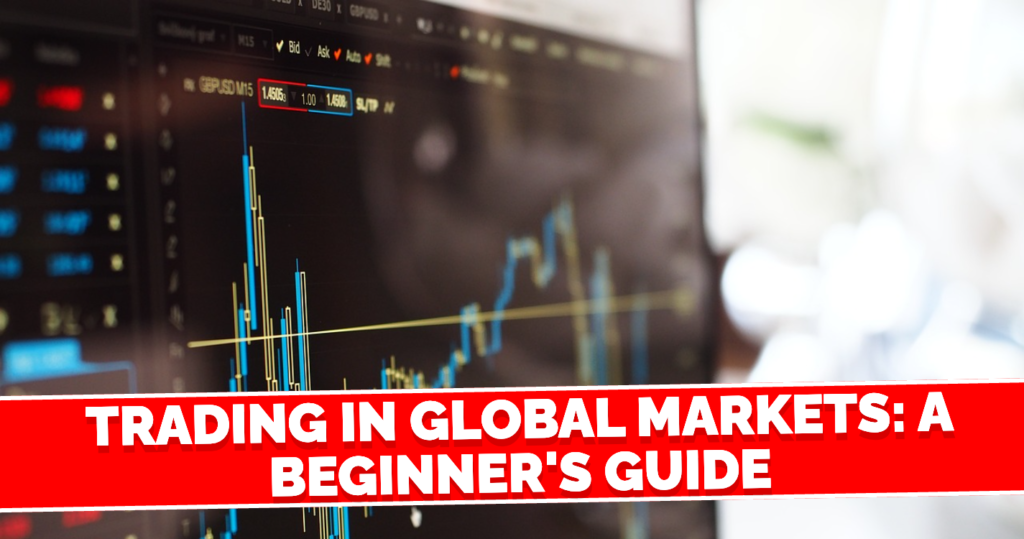Dealing With International Markets
With the expansion of online trading platforms, more and more people are able to trade stocks, commodities, currencies, and indexes on global markets. Stepping into this ever-changing environment may be an exhilarating and daunting experience for newcomers.
The term “global markets” describes the vast network of financial exchanges throughout the world where commodities, currencies, stocks, and bonds are traded. Because these markets are open 24/7, traders have access to opportunities regardless of their location.
Here are some important types of international markets:
- Securities Exchanges: Places like the New York Stock Exchange (NYSE) and the National Association of Securities Dealers (NASDAQ) facilitate the purchase and sale of company shares.
- Currency trading takes place in the most extensive market, known as the Forex.
- The commodities market is a place where people may buy and sell things like food, oil, and gold.
- The S&P 500 and the FTSE 100 are two examples of indices that measure the overall performance of a stock market index.
Knowing the ins and outs of each market is essential before jumping in headfirst because they all work in their own distinct ways.

Global Market Trading: What Makes It Involved?
The many benefits of trading on global markets make it a desirable alternative for investors all around the globe.
- You can lower your risk by diversifying your holdings across different asset classes and geographies.
- You can simply initiate and exit positions due to the high trading volumes, which ensure liquidity.
- You can trade at almost any time of day because different markets operate at different hours.
These advantages make international markets appealing, but making the most of them calls for self-control and a well-thought-out plan.
How to Start Trading on International Markets
In order to establish a solid trading foundation, beginners must first have a clear path.
- Get Informed. Familiarize yourself with the basics of the market, trading methods, and risk assessment. Get a handle on the fundamentals with the help of online tutorials, books, and courses.
- A Trading Platform to Consider. Find a trustworthy trading platform that works for you. Consider the following features: accessibility to many marketplaces, graphing tools, and ease of use.
- Create an Account to Trade. Register with a broker that is subject to regulation. Verify if the broker can connect you to the international marketplaces that pique your interest.
- Get Started With A Little. You can practice with a trial account or make tiny investments to avoid risk.
- Track the Markets. Keep up with the latest headlines, economic happenings, and market trends throughout the world. The market is very sensitive to these issues.
Important Advice for New Investors
For those just starting out, the key to making it big in the global markets is to lay a solid groundwork and stay away from the typical traps.
Remain Committed to a Plan
Create a trading strategy that specifies your objectives, level of comfort with risk, and favorite assets. Maintaining concentration and reducing impulsive choices are both aided by a methodical strategy.
Be Aware of the Dangers
Market volatility and losses due to leverage are two of the inherent dangers in trading. Never risk more money than you can afford to lose in a deal.
Explore CFD Trading
If you want to take advantage of chances to bet on price changes across different global marketplaces without really owning the asset, you should educate yourself on CFD trading. You need to know your way around leverage and hazards to utilize this strategy’s versatility.
Make Use of Available Means
Tools like real-time price charts are available on modern trading platforms. Trends can be identified using technical indicators. Risk management tools like stop-loss orders.
You can improve your decision-making capabilities by making use of these features.
Risk Management and Its Significance
Successful traders know the importance of risk control. In its absence, even the most well-planned moves can backfire spectacularly.
A few important methods for managing risks are:
- Establishing orders for stop-loss: Establish in advance the highest possible loss you can bear.
- Spreading your money around: Diversify your holdings by investing in different marketplaces and types of assets.
- Not using too much leverage: Leverage boosts earnings, but it also makes losses more likely.
You can safeguard your wealth and maintain growth over the long run by making risk management a top priority.
Consistent Obstacles in International Trade
Despite the vast prospects presented by global trade, novices frequently encounter obstacles that necessitate careful consideration.
It might be challenging for newcomers to sift through the seemingly endless stream of data to get what they need. Maintaining market awareness without being overwhelmed requires focusing on important market indicators and news sources.
Impulsive trades might be caused by greed and fear. The key to success in the long run is to not let your emotions get in the way of your strategy and to stick to it.
Dealing with currency swings is a common aspect of international market trading. This risk can be reduced by learning the fundamentals of Forex.
Last Remarks
For newcomers who put in the time and effort to learn the ropes, trading on international markets may be a lucrative endeavor. You can achieve your trading goals in these complex markets if you educate yourself, have a good plan, and concentrate on risk management.
It takes time to become a successful trader. To succeed in global markets, one must be patient, constantly learn new things, and work hard.